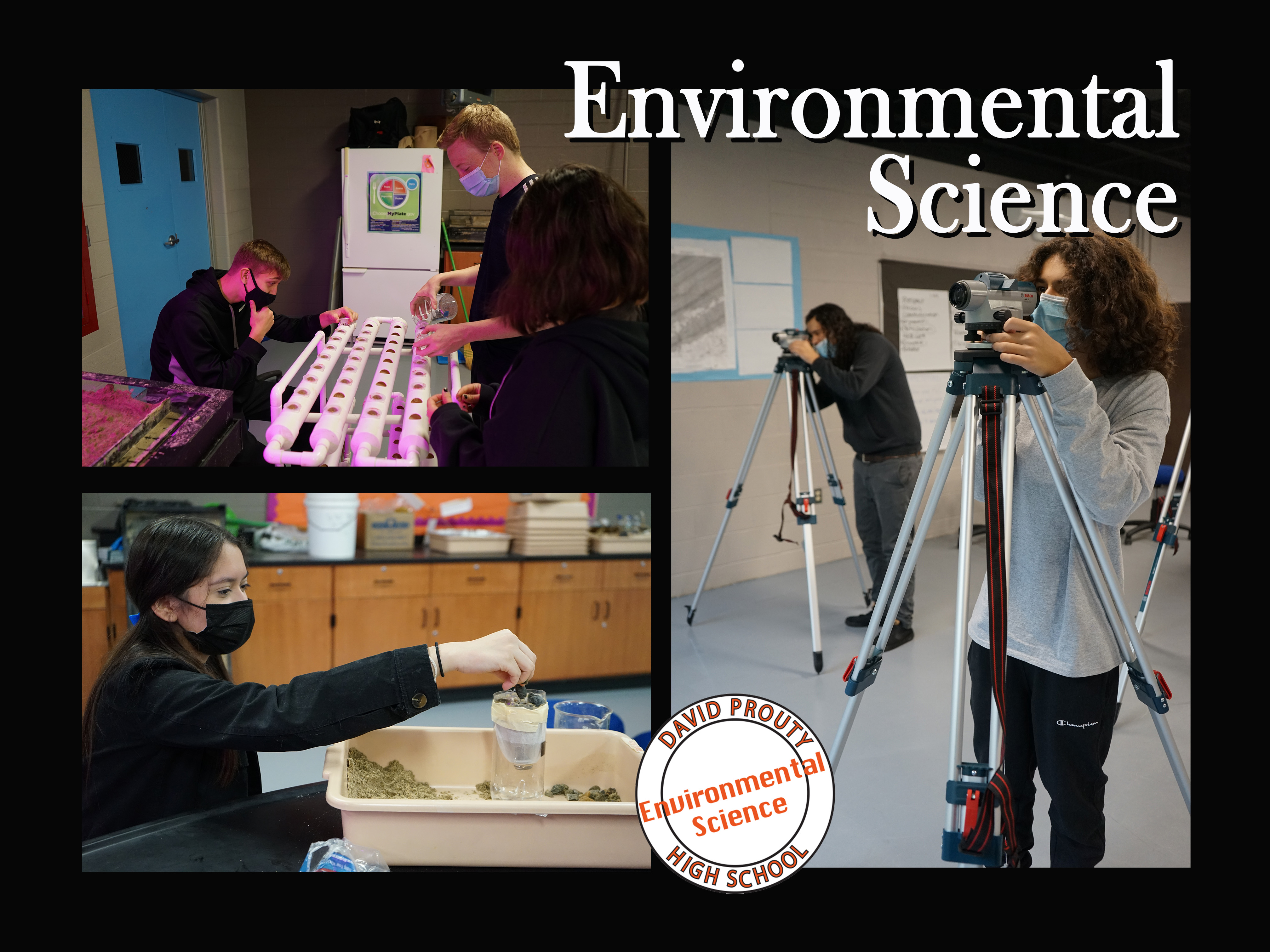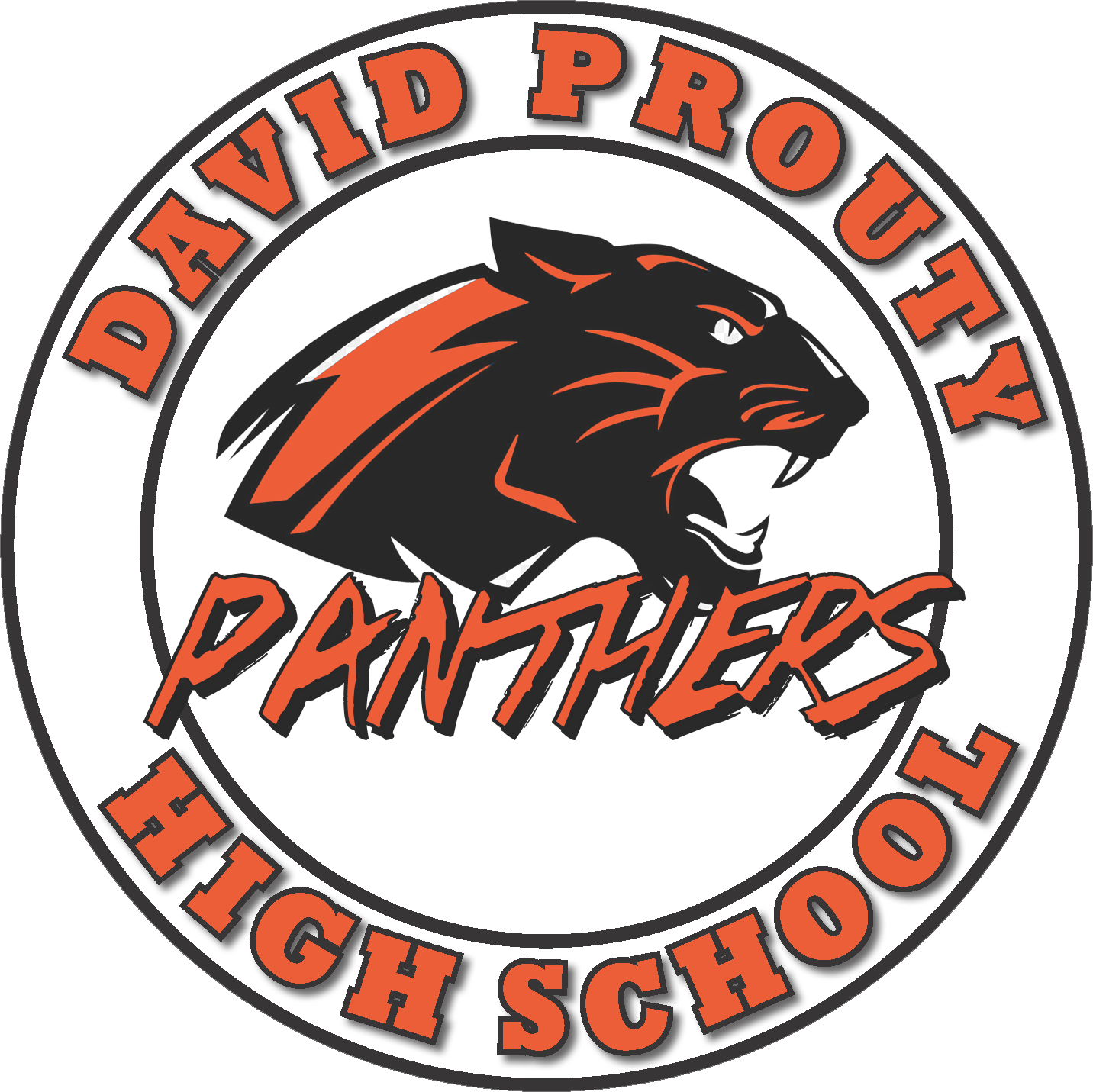
Environmental Science
GRADE 9
EXPLORATORY (SC) 1 UNIT
This full semester class introduces all freshmen to the multiple pathways and vocational programs available at David Prouty High School, while developing study and organizational skills necessary to navigate high school. They will engage in career exploration and portfolio creation using Naviance. Portfolios created will be supplemented in all subsequent CTE courses, and presented in the Senior Capstone. Students will have the opportunity to apply to vocational programs of their choice at the end of their exploratory.
ENVIRONMENTAL SCIENCE I (SC) 1 UNIT This course introduces students to core concepts necessary in pursuing a career in environmental science or environmental science technology using Naviance. In addition to identifying career paths, students will learn to identify the role of the Environmental Protection Agency (EPA), OSHA, and other workplace and environmental protection regulations that apply to specific tasks and jobs in the field. Academic skills are embedded as students explore the fundamentals of environmental hazards, reporting, and safety.
GRADE 10
ENVIRONMENTAL SCIENCE II (SC) 2 UNITS
Students will explore and demonstrate knowledge of beginning fieldwork in environmental science and technology. Soil, air, and water sampling and testing will be covered in depth. Sophomores become proficient with the testing and maintaining of water and soil quality, troubleshooting, and data collection. Several hands-on methods for sampling groundwater and soil are taught to students in detail using industry recognized techniques. Student computer skills are enhanced through data entry and analysis and allow for an understanding of trends and reasons for changes in water quality. Career exploration continues, using Naviance, field site visits, and job shadows.
EARTH AND THE ENVIRONMENT (SC/H) 1 UNIT This project-based lab science class covers the interdisciplinary intersection of physical, chemical, and biological sciences as they pertain to Earth and the environment. There is a focus on understanding the scientific principles underlying the Earth’s soil, water, and atmosphere in relationship with pollution and human energy needs. By connecting students to the beauty of geological history, the amazing landforms around the globe, the nature of the sea and air, and the newest discoveries about our universe, it gives students an opportunity to solve problems in their everyday world. Our topics could include Geology (study of rocks, earthquakes, volcanoes and plate tectonics), Meteorology (study of the atmosphere, climate and climate change), and Oceanography (study of the oceans and water systems). Students will have the opportunity to work on hands-on experimentation, activities, and projects.
GRADE 11
ENVIRONMENTAL SCIENCE III (SC) 2 UNITS
Eleventh grade students take part in fieldwork in environmental science and technology, natural resource management and land-use planning using industry recognized mapping software. Students learn about groundwater contamination sources and design remediation solutions using groundwater flow simulator models. Students learn about toxicology and the effects of hazardous substances on plants, animals and humans. Student career occupations are identified, resumes and cover letters are developed, and career planning extends to include entrepreneurship. Industry professionals share their expertise in all aspects of opening their own business during career seminars and field trips to environmental agencies. Students will prepare for industry certifications as appropriate to individual career interests.
CHEMISTRY I (H, SC1) 1 UNIT This is a laboratory course designed for the student whose career goals lie within the areas of pure science and who would like to enter the field of engineering or who would need a fundamental knowledge of chemistry because they intend to follow a career in nursing, medical or health technology or some allied field which requires considerable scientific background. It is assumed that anyone electing this course has sufficient knowledge of mathematics to solve math-related chemistry problems. Course content will stress atomic structure, quantum mechanics, periodic law, formula and equation writing, molecular composition, gas laws and solutions. Primary emphasis will be placed upon the laws which govern chemical changes, and the general processes necessary to explain and confirm the general hypotheses of chemical concepts. In order to provide a foundation for work at the college level, the course will include an introductory summary of biochemistry and organic chemistry. Experiments are designed to teach the students safety and proper methods, techniques and procedures to prepare them to function in a laboratory with ease and gain an appreciation of the necessity for precision and accuracy. In some classes, lab investigations will include experiments in basic analytical work to identify an unknown salt along with written term papers. Written tests and exams are used for evaluation. Open to students in grades 10 - 12.
Prerequisite: Grade of C or better in Algebra I.
OPTIONAL: AP ENVIRONMENTAL SCIENCE (AP) 2 UNITS AP
Environmental Science is a rigorous, college-level class in the biology, chemistry, physics, and statistics underlying Environmental Science. Students will learn about the natural world through hands-on laboratory investigations, explorations, and observations. They will analyze and identify both human-made and natural environmental problems in their local ecosystem by investigating the interrelationships of the natural world, evaluate the relative risks associated with these problems, and examine solutions for resolving and/or preventing them.
GRADE 12
ENVIRONMENTAL SCIENCE FIELD WORK (SC) 2 UNITS Students will apply the skills they have learned in their Environmental Science program by working with local agencies, water treatment facilities, farms, and tech companies.
SENIOR CAPSTONE (SC) .5 UNITS This course will focus on the fundamentals of finding a job and/or starting, managing and marketing a business. Students will work with their Chapter 74 teacher to connect the vocation they have studied to these principles while also considering legal, ethical, and social responsibility for businesses. Students will finish their resumes and portfolios in Naviance, and take part in mock interviews with potential employers and investors. Principles of personal financial management will also be highlighted.
